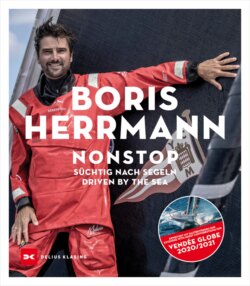Читать книгу Nonstop - Boris Herrmann - Страница 10
На сайте Литреса книга снята с продажи.
PROLOGUE BY JOCHEN RIEKER
ОглавлениеIt would be easy to believe that Germany’s best sailors are related, as all of their names end with »-mann«. There’s Wilfried Erdmann, the extreme sailor, one of fewer than a dozen people to have circumnavigated the globe against the prevailing winds without making a single stop. There’s Jochen Schümann, three-time Olympic champion and the sole German America’s Cup winner to date. And there’s Boris Herrmann, high-sea professional, recordchaser and solo skipper.
The youngest of the top sailors, he has turned what could have been written off as a coincidence into a minor series, a kind of unwritten law. And it’s not just his name that positions him snugly between the other greats, one of whom he admired even as a child for his sailing feats, while teaming up with the other as a navigator and winning renowned high-sea regattas – more of which later on. And even if he’s very different, both as a person and a top sportsman, he has been operating for some time on a similarly rarefied level as these exceptional seamen.
A NEW ERA?
»Maybe,« news magazine »Der Spiegel« wrote in 2008, »a new era has begun with Boris Herrmann.« He had just made his Class40 début and taken a sensational second place in the Artemis Transat, a notoriously tough single-handed race across the North Atlantic. And this was just the beginning.
In the past ten years, the native of Oldenburg has made first- and second-place finishes by the dozen. He is the first German to have won a round-the-world regatta. The first to have gained international recognition in the Imoca60 class. The only one to have sailed non-stop around the world three times, the first time in 100 days, and the second in an unbelievable 47 and now in 80 days.
He could even have been the first German to win the Jules Verne Trophy with the fastest circumnavigation under sail power in a fabulous 40 days. But shortly before the winning passage of Francis Joyon’s Idec Sport, on which he was due to sail, he signed off. A decision he didn’t make lightly – that’s not his style – he had no alternative.
The fact was that Boris Herrmann’s first Vendée Globe project was starting at the same time, and this was his big dream, his ultimate goal and his true destiny.
It is one of the stories told in this book. The greatest challenge he has ever faced: single-handed, non-stop around the great capes, through doldrums and storms, pitching back and forth between total exhaustion and indescribable euphoria on a lightning-fast, incredibly complex, inhumanly sparse carbon-fibre yacht on foils.
What kind of person aspires to such a goal? What’s required to pass such a test? Or rather: to pass with flying colours? Where does a drive like this come from? The book also grapples with these questions.
It’s Boris’s own story, in his own words, bolstered by appraisals and anecdotes from his most significant companions. A very personal, exceptionally open and manylayered sailing book that adds a number of facets to the public and published image of the 39-year-old sailing hero.
LESS LINEAR THAN IT SEEMS
It doesn’t skirt around the trepidation that can be triggered at the start of a solo race, the huge stress factors to which the skipper is exposed, nor why even a man such as Boris can struggle with seasickness at times. A biography whose supposed linearity doesn’t prevent it from showing how erratically some situations in Boris Herrmann’s life have followed one another.
Everything seems logical in hindsight, almost as though there has been a master plan. A young cruiser and dinghy sailor reads in »YACHT« about the MiniTransat race on short 6.50-metre high-sea racers, is gripped by the idea, finds sponsors, somehow makes it to the starting line upon finishing school and makes a very acceptable crossing of the Atlantic. Carries on sailing his dinghy while studying business. Is already planning. Moves up to Class40 after his exams. Closes in on the best in the world, in particular gaining entry to the high-sea scene dominated by the French. Makes the jump to the Imoca class, in which he also impresses in the Barcelona World Race. Joins up with Giovanni Soldini and sets records on Maserati, a modified VOR70. Becomes a crew member on Idec Sport, one of the fastest maxi-trimarans. And now, the climax, a Vendée campaign on Malizia2 – Yacht Club de Monaco, one of the most advanced and best Imocas ever built.
It has the appearance of a smooth run. And in many ways it has been. But there have also been breaks, loose ends, unexpected diversions. These things are typical in an extreme sport that relies heavily on both sponsoring and patronage and isn’t merely a business case, albeit a very good one, but also demands the lifeblood and passion of its promoters. High-end sailing is a sport whose successes are also accompanied by precarious dry spells.
THE WAIT
This book should really have appeared quite some time ago. Boris Herrmann planned to write it in 2011 after his success in the Barcelona World Race, where he came fifth on an old boat, his »apprenticeship for the Vendée Globe« as he once put it himself. At the time, he was aiming to take on the Mount Everest of solo sailing in 2012. But things didn’t turn out that way. Not in 2012, and not in 2016 either.
And maybe he was the first to suspect this. Halfway around the world on Neutrogena, in his mind already almost back in Barcelona, he writes in an email: »A left turn around Cape Horn, then across the Atlantic and home. The descent from the peak. But this’ll be an emotional, winding journey too. What’s coming afterwards, when I’m on the landing stage with my bag beside me?«
The first thing is a great emptiness.
